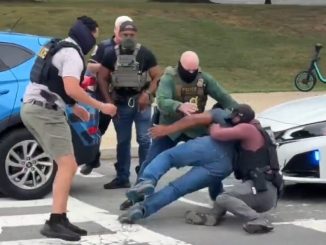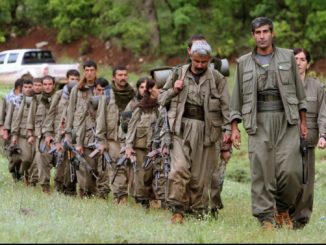
| Published June 30, 2025
A group of families who had their loved ones slaughtered by drug cartels are asking the Trump administration to designate the Juarez Cartel and its armed wing La Linea, as foreign terrorist organizations. The move would place that cartel on the same list as six other Mexican cartels previously designated as FTOs
Five years after a brutal cartel ambush claimed the lives of nine U.S. women and children in northern Mexico, the families left behind are renewing their fight for justice — not with bullets, but with a bold legal request.
In a deeply personal appeal to the Trump administration, members of American Families Against Cartel Terrorism are urging the U.S. government to officially designate La Línea, the armed wing of the Juárez Cartel, as a Foreign Terrorist Organization. The demand, backed by chilling firsthand accounts and a history of cartel violence, seeks to open the door to lawsuits, financial sanctions, and stronger federal tools to dismantle the networks behind the bloodshed. For the grieving families, it’s about far more than policy — it’s about ensuring no other American child suffers the same fate.
📝 What the Families Are Asking
Family of U.S. Children Slaughtered by Cartel Ask Trump to Designate ‘La Línea’ as Terrorist Group
The families of American children murdered in the 2019 La Mora massacre—a grisly cartel ambush in northern Mexico—are pleading with the U.S. government to deliver justice in a way that law enforcement, diplomacy, and past prosecutions have not. Their ask: label the Juárez Cartel’s enforcement wing, La Línea, a Foreign Terrorist Organization (FTO) under U.S. law.
In a formal letter dated June 30, 2025, the group American Families Against Cartel Terrorism petitioned Secretary of State Marco Rubio to recognize the cartel faction responsible for the deaths of nine U.S. citizens—six of them children—as a terror group. Their argument rests on both the severity of violence and the nature of the tactics used by La Línea: planned ambushes, high-powered firearms, civilian targeting, and the calculated use of terror to control regions and populations.
The letter calls the 2019 attack “an act of pure terrorism,” noting that La Línea deliberately fired on women and children, burned victims alive, and used military-style tactics in broad daylight on public roads. According to survivors like Devin Langford—who escaped after watching his mother and siblings killed—the assault was not a case of mistaken identity, but an orchestrated, brutal execution meant to intimidate rivals and civilians alike.
Adriana Jones, president of the organization and a cousin to some of the slain children, wrote:
“If burning babies alive in their car seats doesn’t qualify as terrorism, what does?”
The families emphasize that the FTO designation is not symbolic—it has legal teeth. It would unlock a cascade of enforcement tools, including asset freezes, criminal penalties for providing material support, and new avenues for civil lawsuits. Most importantly, it reframes cartel violence as politically destabilizing and strategically violent, not just “organized crime.”
They are also asking for the Juárez Cartel itself—not just its armed wing—to be labeled as a terrorist group. This broader designation, they argue, would help the U.S. dismantle its financial infrastructure and allow victims to sue under anti-terrorism laws.
This effort is modeled after similar moves earlier in 2025, when the Trump administration labeled eight Latin American cartels, including the Sinaloa and CJNG, as FTOs. That shift paved the way for the family of slain DEA agent Enrique “Kiki” Camarena to sue Sinaloa leaders like Rafael Caro Quintero under terrorism statutes.
For the families of the La Mora victims, it’s not about revenge—it’s about ensuring that criminal organizations that cross into acts of terrorism face consequences, and that victims’ voices shape how the U.S. defines security threats in its own hemisphere.
🔍 Why FTO Designation Matters
Labeling La Línea and the Juárez Cartel as a Foreign Terrorist Organization (FTO) would not be a mere rhetorical move—it would represent a major escalation in how the U.S. legally and strategically confronts cartel violence. For the families of victims, such a designation is about more than symbolism: it’s about unleashing the full legal power of the U.S. government to hold perpetrators accountable and prevent future atrocities.
✅ Unlocking Legal Tools
Once a group is designated an FTO by the State Department under Section 219 of the Immigration and Nationality Act, it becomes a crime for anyone to knowingly provide it with “material support,” including money, weapons, or safe harbor. The U.S. can:
-
Freeze assets tied to the group within U.S. jurisdiction
-
Criminally charge supporters or associates for aiding terrorists
-
Revoke visas or bar entry for any non-citizens linked to the group
-
Pursue civil lawsuits, allowing victims to sue for damages under anti-terror statutes
In this context, families like those from the 2019 La Mora massacre could bring civil suits against known cartel figures and entities—similar to the family of slain DEA agent Enrique “Kiki” Camarena, who sued the Sinaloa Cartel in 2025 after it was designated a terrorist group.
🛑 Crippling Financial Networks
Cartels like La Línea thrive not just through violence, but through their vast transnational business operations: trafficking drugs, weapons, and people across borders. FTO designation activates the Treasury Department’s ability to pursue these networks using counterterrorism financial enforcement tools.
It allows the U.S. to:
-
Blacklist banks or shell companies aiding the cartel
-
Partner with international financial institutions to trace and block cartel assets
-
Dismantle logistics chains that depend on legitimate businesses
According to national security experts, this could do more long-term damage than bullets—by undermining the cartel’s ability to pay fighters, bribe officials, or invest in smuggling infrastructure.
📌 Reframing the Cartel Threat
Perhaps most importantly, the FTO label reframes what cartels are: not just criminal enterprises, but paramilitary actors using terror tactics for strategic control. Groups like La Línea are known for ambushing police convoys, bombing vehicles, hanging mutilated bodies in public, and using narco-videos to threaten rivals.
By designating them as terrorists, the U.S. sends a message that:
-
Cartel violence is not “local crime” but a national security issue
-
The U.S. is prepared to pursue cartel leaders like it does al-Qaeda or ISIS
-
Allies and international bodies should treat cartel actions as acts of terrorism
This opens up options for military or intelligence involvement, though it also raises diplomatic concerns, especially with Mexico.
⚠️ The Diplomatic Tightrope
While victims’ families see the designation as overdue, critics warn it could strain U.S.–Mexico relations. Mexico has historically opposed FTO labels for its cartels, fearing it could justify U.S. military involvement or infringe on its sovereignty.
Still, proponents argue that the scale and brutality of violence—such as the 2019 attack on women and children—demands extraordinary legal measures. They say if the U.S. can designate foreign Islamist or communist groups as terrorists, it must be willing to do the same for heavily armed cartels that commit atrocities just miles from the U.S. border.
🌎 Broader Impact & Debate
The push to designate La Línea and other cartel groups as Foreign Terrorist Organizations (FTOs) doesn’t exist in a vacuum. It’s a move with ripple effects—touching everything from U.S.-Mexico relations and cross-border commerce to immigration policy, human rights law, and international precedent.
🤝 Diplomatic Consequences with Mexico
Perhaps the most immediate impact is diplomatic. The Mexican government—under President Claudia Sheinbaum—has consistently opposed U.S. efforts to label its domestic criminal groups as terrorists. Mexico fears such designations could:
-
Undermine national sovereignty by justifying unilateral U.S. military or intelligence operations inside Mexico
-
Destabilize diplomacy, especially in areas like trade, migration, and security cooperation
-
Stigmatize Mexican nationals, leading to discrimination or mislabeling of migrants as security threats
After previous designations in early 2025 targeting cartels like Sinaloa and CJNG, Mexico’s foreign ministry issued strong objections, calling it a “violation of international norms” and warning it could trigger unintended confrontations between U.S. agencies and Mexican institutions.
Still, some Mexican families of cartel victims—especially dual nationals—support the move, frustrated by what they see as government inaction or collusion with cartel forces. The designation debate has thus fractured both countries internally: between victims and governments, between nationalists and pragmatists.
💰 Economic Implications
Designating major cartel organizations as terrorists could affect legitimate commerce in subtle but serious ways. Financial institutions, logistics companies, and exporters that unknowingly interact with entities linked to cartels may face scrutiny or penalties. This could:
-
Create banking hesitancy in U.S.–Mexico trade corridors
-
Lead to delays in agricultural exports/imports
-
Raise the cost of due diligence for cross-border businesses
Some critics warn that overly broad designations might chill investment in Mexican manufacturing, energy, or transportation sectors—especially in cartel-dominated regions.
🧑⚖️ Immigration and Asylum Consequences
There’s also concern the FTO designation could reshape immigration policy, particularly regarding asylum claims from Mexican citizens. Under current law, association with an FTO—even under coercion—can disqualify individuals from seeking asylum or legal entry into the U.S.
This could impact:
-
Civilians forced to cooperate with cartels under threat
-
Trafficking victims fleeing cartel control
-
Migrants from cartel-controlled municipalities unfairly flagged by DHS
Human rights groups argue this creates a dangerous catch-22: Mexicans flee cartel violence, but are turned away because the cartel is now considered a terrorist entity.
🧭 Setting a Global Precedent
If the U.S. solidifies the practice of labeling transnational criminal organizations (TCOs) as FTOs, it could lead other countries to rethink how they define terrorism. It could open the door for similar designations of:
-
African or Asian narco-militias
-
Russian-linked mercenary networks like Wagner
-
Foreign cybercrime syndicates that cause national disruption
Supporters argue this evolution reflects the 21st-century reality: that terror is not limited to religious extremism, but includes criminal violence that destabilizes governments, kills civilians, and wields fear as a weapon.
 Overall Takeaway: A Line in the Sand
Overall Takeaway: A Line in the Sand
For years, cartel violence has spilled across our southern border, leaving American families shattered and communities terrorized. The massacre of women and children in La Mora wasn’t an isolated criminal act—it was a calculated, barbaric assault by an organization that operates more like a paramilitary death squad than a drug gang.
The demand to designate La Línea and the Juárez Cartel as Foreign Terrorist Organizations is not just a legal request—it’s a moral reckoning. These families aren’t asking for special treatment. They’re asking for the U.S. government to stand up and say: when Americans are targeted with terrorist tactics, there are consequences.
By labeling these cartels as what they are—terrorist groups—the United States can finally use every legal and financial tool available to dismantle them, hold their leaders accountable, and signal to the world that American blood will not be spilled without a response.
It’s time to stop treating cartel violence as mere organized crime and confront it for what it has become: a national security threat that demands a bold, uncompromising answer.





Be the first to comment